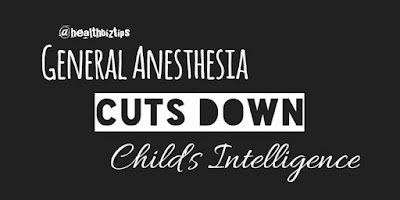Their are cases when children have to undergo surgery and be given general anesthesia. Undergoing surgery is scary enough. Even so, knowing that general anesthesia can cut down a child's intelligence can freak out some parents.
@healthbiztips by Arlene Gentallan
A child's brain development during their formative years (6-12 years old) raises great concern among parents.
When major surgery is deemed necessary, the use of anesthesia is a must...unless you want the surgery to be a living nightmare. But the use of general anesthesia does have it's downside when it comes to intelligence.
Researchers found out that children exposed to general anesthesia has a marked reduction in intelligence. Children experience impairment in memory and difficulty learning.
It is alarming that the bad impact of general anesthesia has over intelligence is dramatic even up to 3 month after undergoing operation.
It isn't until 1 year after surgery that a child is able to fully recover from the bad effect of general anesthesia over their intelligence. Which is both a bad news and a good news. The downside is the number of months a child has to painstakingly cope with, which, by the way, is a pretty long time. This can possibly result to a poor academic performance.
The upside is that full recovery from general anesthesia is possible.
In my opinion, we shouldn't be stupefy. Knowing the impact of general anesthesia over intelligence is crucial so parents, teachers, and caregivers wouldn't freak out, thinking that their child becomes less smart. Instead, see this as a part of a process the child will eventually outlive, given enough time. Patience, support, and understanding when it comes to teaching the child will go a long way.
What is general anesthesia?
General anesthesia is given to a person to make him/her unconscious so he/she will not feel the pain of undergoing a surgical operation.
Resource:
Zhang, Q., et al. (2017). Long-duration general anesthesia influences the intelligence of school age children. BMC Anesthesiology. DOI 10.1186/s12871-017-0462-8
 |
| General Anesthesia cuts down Child's Intelligence |
@healthbiztips by Arlene Gentallan
A child's brain development during their formative years (6-12 years old) raises great concern among parents.
When major surgery is deemed necessary, the use of anesthesia is a must...unless you want the surgery to be a living nightmare. But the use of general anesthesia does have it's downside when it comes to intelligence.
Researchers found out that children exposed to general anesthesia has a marked reduction in intelligence. Children experience impairment in memory and difficulty learning.
It is alarming that the bad impact of general anesthesia has over intelligence is dramatic even up to 3 month after undergoing operation.
It isn't until 1 year after surgery that a child is able to fully recover from the bad effect of general anesthesia over their intelligence. Which is both a bad news and a good news. The downside is the number of months a child has to painstakingly cope with, which, by the way, is a pretty long time. This can possibly result to a poor academic performance.
The upside is that full recovery from general anesthesia is possible.
In my opinion, we shouldn't be stupefy. Knowing the impact of general anesthesia over intelligence is crucial so parents, teachers, and caregivers wouldn't freak out, thinking that their child becomes less smart. Instead, see this as a part of a process the child will eventually outlive, given enough time. Patience, support, and understanding when it comes to teaching the child will go a long way.
What is general anesthesia?
General anesthesia is given to a person to make him/her unconscious so he/she will not feel the pain of undergoing a surgical operation.
Resource:
Zhang, Q., et al. (2017). Long-duration general anesthesia influences the intelligence of school age children. BMC Anesthesiology. DOI 10.1186/s12871-017-0462-8
General Anesthesia cuts down Child's Intelligence
4/
5
Oleh
methewriter



